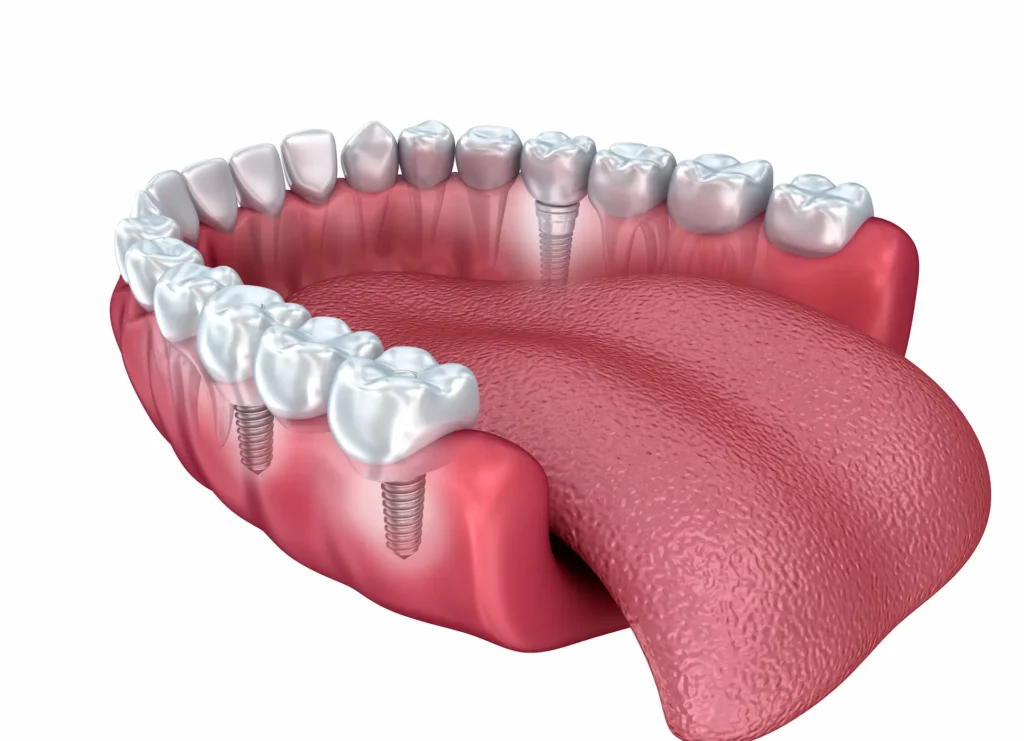Dental implants are a revolutionary way to replace missing teeth and are becoming increasingly popular. And why shouldn’t they? Dental implants offer a permanent solution that looks and functions just like natural teeth–but do you need anesthesia for dental implants?
This blog provides the information you need to answer the question, ‘Do I need anesthesia for a dental implant?’ In most cases, anesthesia is recommended as it can help make the procedure more comfortable and reduce any pain or discomfort experienced during the implant placement.
Do You Need Anesthesia for Dental Implant?
Yes, you need anesthesia for dental implants. Anesthesia may be administered locally or intravenously, depending on the complexity of the procedure and the patient’s preference.
Dental Implant Procedure Overview
The dental implant process begins with an initial consultation and comprehensive diagnostic package. During the consultation, your dentist will design a custom treatment plan to address all your needs. If you choose to proceed, the implant will be placed either that day or on a future date.
The placement of the implant is performed with a minimally invasive technique under sedation, if you choose, to create an anxiety free solution. This part of the process typically lasts 1-2 hours and you will leave with a tooth that bridges the time while your implant begins to osseointegrate. Finally in 12 to 14 weeks your permanent implant crown will be delivered creating a permanent solution to your missing or compromised tooth.
After the dental implant procedure is completed, the patient must follow all post-operative care instructions provided by their dentist. This includes brushing and flossing regularly, eating a balanced diet, avoiding smoking, and visiting the dentist regularly for follow-up appointments.
Anesthesia Options for Dental Implant Procedures

When undergoing a dental implant procedure, anesthesia is often used to make the experience more comfortable for the patient.
The type of anesthesia used during the procedure depends on the complexity of the implant and the individual patient’s needs. The most common forms of anesthesia used during dental implant procedures are local anesthesia, sedation, and general anesthesia.
Local anesthesia is a type of anesthetic that numbs the area around the dental implant. This helps to minimize the amount of pain and discomfort experienced during the procedure. Local anesthesia is typically administered through injections and can last for several hours, depending on the patient’s individual needs.
There are a few different types of sedation available for dental implants.
Oral sedation
Oral sedation is a form of conscious sedation where the patient takes a pill prior to the procedure. This type of sedation helps to relax the patient and make them more comfortable during the procedure.
Nitrous oxide
Nitrous oxide, also known as “laughing gas”, is another form of sedation which is administered through a mask. It is fast-acting and wears off quickly.
Intravenous (IV) sedation
Intravenous (IV) sedation is also available and is administered through an IV. This type of sedation is often used for longer procedures and provides a deeper level of relaxation.
When considering dental implant surgery, it is important to discuss anesthesia preferences with your dentist. Your dentist will be able to help you decide on the best type of anesthesia for your particular procedure and explain any potential risks or side effects.
Factors Affecting the Need for Anesthesia
The complexity of the case, the patient’s comfort level and anxiety levels may all influence the need for anesthesia during dental implant procedures.
In some cases, local anesthesia may be sufficient to ensure patient comfort during the procedure. However, if the implant procedure is more complex or the patient has a higher level of anxiety, general anesthesia may be recommended.
The complexity of the implant procedure is an important factor in determining the need for anesthesia. If the procedure is complex and involves multiple sites, general anesthesia may be recommended. For simpler cases, local anesthesia may be sufficient to ensure patient comfort during the implant surgery.
In some cases, the use of anesthesia may be necessary to ensure the patient’s comfort and safety. These include cases where the patient has a high level of anxiety, if the implant procedure is complex, or if the patient has difficulty staying still during the procedure.
On the other hand, local anesthesia may be sufficient to ensure patient comfort during the implant procedure. Examples of these cases include single-site implants or simple full arch reconstructions. In these cases, patient comfort and safety can be maintained without the use of general anesthesia.
Benefits and Considerations of Anesthesia for Dental Implants

Anesthesia is an important part of the dental implant procedure, as it helps to make the patient comfortable and ensure a pain-free experience.
But what does anesthesia do?
Anesthesia works by blocking the sensory nerves, providing instant relief from pain. It not only reduces the chances of complications like infection but also helps in minimizing the time spent in the dental chair.
One of the great benefits of anesthesia is its ability to alleviate anxiety and make the dental implant procedure much more comfortable for patients. It not only helps in reducing pain but also ensures that the patient remains at ease throughout the entire process.
With anesthesia, patients can have a pain-free experience, allowing them to relax and enjoy the dental implant procedure. It’s important to have a discussion with your dentist to explore the anesthesia options that would best suit your specific needs.
While anesthesia is generally safe and effective in relieving pain during dental implant procedures, it’s essential to be aware of potential risks and side effects associated with its use. Nausea, vomiting, dizziness, and an increased risk of infection are some of the concerns that should be discussed with your dentist prior to the procedure.
At Hanna Dental Implant Center, we understand the importance of patient comfort and safety. That is why we encourage all of our patients to have an open discussion with their dentist regarding anesthesia options.
Our team can help to provide information on the different types of anesthesia available, as well as the potential risks and side effects associated with each option.
Our goal is to ensure that each patient is comfortable and informed throughout the entire dental implant procedure. Schedule a consultation today.
FAQs
Can you get a dental implant without anesthesia?
In certain cases, anesthesia may be required to ensure a comfortable and safe procedure. It is important to discuss all options with your doctor before the procedure so that you can make an informed decision.
Is it painful to get a dental implant?
No, the process of getting a dental implant should not be painful. Depending on the patient’s circumstances, anesthesia may be used to ensure a painless experience.
How long does dental implant surgery take?
The length of a dental implant procedure can vary depending on the individual case. Generally, the procedure can take anywhere from one hours or more.
Is IV sedation used for dental implants?
Yes, IV sedation may be used for dental implant procedures. This type of sedation is delivered intravenously and is a safe and effective way to ensure that the patient is comfortable and pain-free during the procedure.
Are you curious if you need anesthesia for dental implant procedures?
At Hanna Dental Implant Center, we understand that undergoing a dental implant procedure can be a nerve-wracking experience. That’s why our team of specialists, led by Dr. Raouf Hanna, is committed to providing the most advanced, comprehensive and comfortable implant treatment available.
If you’re considering a dental implant procedure in Houston, come to the experts at Hanna Dental Implant Center. Our team of experienced professionals will ensure that you get the highest quality of care possible. Contact us today to learn more.



